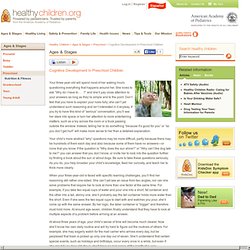

Cognitive Development in the Preschool Years. Cognitive Development In Preschool Children. Your three-year-old will spend most of her waking hours questioning everything that happens around her.

She loves to ask “Why do I have to . . . ?” And she’ll pay close attention to your answers as long as they’re simple and to the point. Don’t feel that you have to explain your rules fully; she can’t yet understand such reasoning and isn’t interested in it anyway. If you try to have this kind of “serious” conversation, you’ll see her stare into space or turn her attention to more entertaining matters, such as a toy across the room or a truck passing outside the window. Instead, telling her to do something “because it’s good for you” or “so you don’t get hurt” will make more sense to her than a detailed explanation. Early Child Development - Nutrition. The effect of undernutrition on young children (ages 0-8) can be devastating and enduring.

It can impede behavioral and cognitive development, educability, and reproductive health, thereby undermining future work productivity. Since growth failure occurs almost exclusively during the intrauterine period and in the first two years of life, preventing stunting, anemia, or xerophthalmia, therefore calls for interventions, which focus on the very young. Whether or not children are well-nourished during their first years of life can have a profound effect on their health status, as well as their ability to learn, communicate, think analytically, socialize effectively and adapt to new environments and people. Good nutrition is the first line of defense against numerous childhood diseases, which can leave their mark on a child for life.